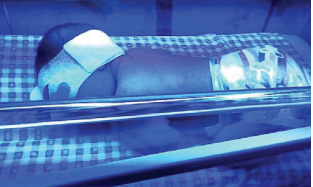Download and print as a PDF (555kB pdf)
On this page
What is neonatal jaundice?
Jaundice is a common condition that causes yellowing of the skin and the whites of the eyes in newborn babies. It usually harmless and clears up on its own after 10 to14 days. Jaundice occurs when there is a build up of the yellow pigment bilirubin in the blood, skin and eyes. Newborn babies naturally release extra bilirubin into their bloodstream but their immature livers often can’t process it fast enough. In most babies jaundice is not harmful. However, very high levels need treatment to prevent complications, so it is standard for jaundice levels to be monitored in the first few days of life, usually by your midwife or health visitor.
If your baby is jaundiced, they may:
• Have yellowing of the skin, the whites of the eyes and the inside mouth.
• Be more sleepy.
• Not want to feed as much as usual.
More worrying causes of jaundice can result in your baby’s urine being very dark and their poo being pale or white.
Does my baby need any tests?
During their visit to CED today your baby will have their bilirubin levels checked using a ‘transcutaneous bilirubinometer’. This is a monitor that we lightly press against your baby’s chest and does not hurt.
Depending on the bilirubin level, your baby’s gestation, how old your baby is, or if there is any concern that your baby is sleepy or not feeding well, a doctor or nurse practitioner will fully examine your baby and may arrange for a blood test to get a more accurate level.
Does my baby need any treatment?
Your baby’s blood bilirubin level will determine the treatment your baby will receive. If the bilirubin level is below the level at which treatment is needed (‘the treatment line’), most of the time your child’s jaundice can be left to clear up on its own within a couple of weeks. Good hydration and having regular bowel movements can help speed up elimination of bilirubin, so your baby may need some feeding support which we will offer in CED.
If the bilirubin level is above the treatment line you and your baby will need to be admitted to hospital for phototherapy. This is a type of artificial UV light treatment that removes excess bilirubin in the skin by converting it in to harmless products that your baby can more easily pass out of their body.
Your baby will need to be undressed, nursed in a cot and have their eyes protected from the light using a special mask. Your baby’s bilirubin levels will determine the intensity of the light therapy and how long it lasts.

Don’t worry, your baby will be kept warm and in most cases you will still be able to feed your baby. However, if their levels are very high, and / or more intensive treatments are required, they made need an intravenous drip or feeding tube. Your doctor or nurse practitioner will discuss this with you in the unlikely event that this is required.
Your baby’s bilirubin levels will be tested regularly whilst in hospital to see if the treatment is working. Once your baby’s level falls below the treatment line, they will be discharged home. Most of the time this takes up to 24 to 48 hours.
What will happen after today?
If your baby does not need treatment today, but their bilirubin level is close to the treatment line, or your baby is premature or very young, your doctor or nurse practitioner will ask for you to return to CED in 18 to 24 hours for a repeat blood test to see if your baby’s level has increased or decreased.
If the level has increased your baby may need phototherapy or to return after 24 hours for a repeat test. Your doctor or nurse practitioner will let you know if this is the case.
If the level has decreased, your baby will not need any treatment or tests after today unless the jaundice is still present after when your baby is 10 to14 days old. If this happens, your baby will be referred to our prolonged jaundice clinic for reassessment. Most babies who are seen in the prolonged jaundice clinic do not need any treatment but may have another blood test.
What can I do for my baby at home?
• Ensure that your baby is having regular breast or bottle feeds, at least every 2 to 3 hours, and is passing regular wet and dirty nappies.
• Let your health visitor know if your baby is still jaundiced after 10 to14 days.
• Seek medical assistance if your baby is not feeding as well or seems sleepier than usual or develops a fever or you are worried.
Useful numbers and resources
Bliss: the special care baby charity
The Breastfeeding Network
La Leche League
National Childbirth Trust
For out of hours GP service or advice.
NHS
111
Royal Alexandra Children’s Hospital, Children’s Emergency Department.
Please be aware that CED staff will not be able to give you medical advice for your child over the phone but can direct you to an appropriate service to assist with your enquiry.
01273 696955
Ext. 62593
Produced by the Children’s Emergency Department Authors: ML, KB, KO.
This leaflet is intended for patients receiving care in Brighton and Hove or Haywards Heath.
The information in this leaflet is for guidance purposes only and is in no way intended to replace professional clinical advice by a qualified practitioner.